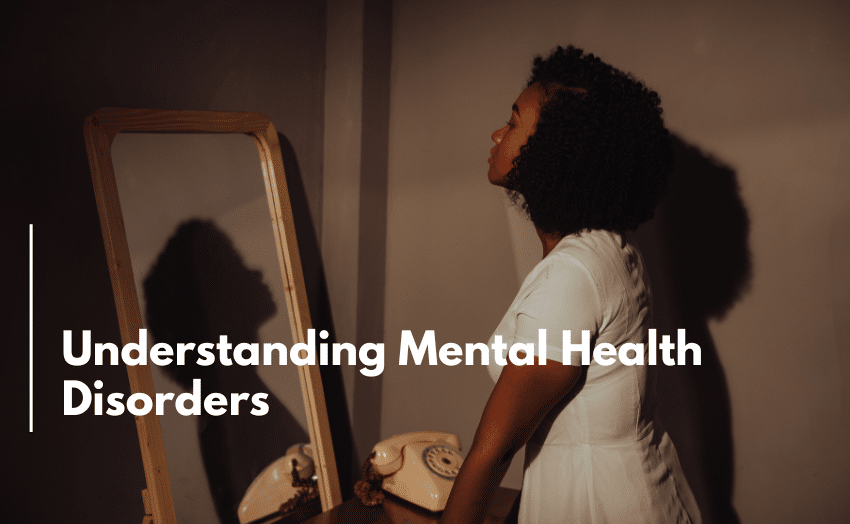Mental health is often stigmatized and misunderstood despite its importance to our well-being. If we just talk about it, we can all do our part to end the discrimination and prejudice that people with mental illness face. Our goal in this post is to raise awareness and comprehension of mental health issues by having an in-depth conversation about them.
Why Is Mental Health So Crucial?
Physical and mental well-being are equally important. It includes how we feel emotionally, mentally, and socially. A healthy mind helps us deal with challenges, connect with others, and make wise decisions. We need to improve general health and prevent mental health illnesses; it is essential to acknowledge the significance of mental health.</p>
Classifications of Mental Illnesses</strong>
Mental health disorders come in a vast variety, each with its own signs and symptoms. These illnesses do not discriminate on the basis of age, gender, or socioeconomic status. Anxiety disorders, depression, bipolar disorder, schizophrenia, OCD, and PTSD are some common mental health issues people face. Recognizing mental health issues for what they are, real medical diseases needing correct diagnosis and treatment is crucial.
We can create the road for compassion and efficient support systems if we eliminate stigma and increase awareness.
Taking the Stigma into Account
Stigma is the harmful labeling and stereotyping of those who experience mental health issues. As a result of this prejudice, many people avoid getting treatment. Acknowledging the harmful effects of stigma on people with mental health issues and taking steps to lessen its prevalence in society is critical.
Misconceptions About Mental Illness
Disorders of the mind are an indicator of moral deficiency.
The idea that people with mental health issues are somehow less strong or less determined is a prevalent myth. In truth, mental health illnesses are complicated conditions that stem from a wide range of interrelated causes. They are not an indication of moral corruption on your part.
Disorders of the Mind Are Extremely Uncommon
The idea that people with mental health problems are unusual is another common fallacy. However, we tend to underestimate the prevalence of mental health issues. The WHO reports that about one-quarter of the world’s population will suffer from a mental health problem in their lifetime. An awareness of the widespread nature of mental illness can break down barriers of stigma and foster compassion.
Eliminating Stereotypes and Prejudices
The shame that comes along with having a mental health problem is a significant obstacle to treatment. Discrimination, shame, and reluctance to talk about or seek help for mental health difficulties are all consequences of stigma. We can make society more accepting of people with mental health issues by eliminating stigma and promoting education. Stigma can be dismantled via the use of education and honest discussion.
Individuals with Mental Health Problems May Pose a Threat to Others
This falsehood reinforces prejudice and paints an inaccurate picture of people with mental health issues, leading to harmful stigma. Most of the time, people with mental health issues are not violent, despite popular belief. They are more likely to be assaulted than to commit violence. It’s crucial to dispel this misconception and encourage a sympathetic view of people who struggle with mental health issues.
Online Doctor Consultation for Mental Health</strong>
The digital age has revolutionized healthcare, providing convenient access to medical services. Online doctor consultations have become increasingly popular, offering a convenient and confidential platform for individuals to seek help for their mental health concerns. Whether it’s finding a GP near you, accessing online GP registration services, or seeking an online dermatology consultation, online healthcare options have made mental health support more accessible than ever.
Dermatologists’ and Allergists’ Contributions to Emotional Well-Being
Both psychological and physiological well-being are interdependent. Allergies and other skin problems can have a significant psychological impact. By treating the underlying physical causes of emotional distress, dermatology, and allergy medicine specialists provide invaluable mental health assistance. Consultations with dermatologists and Allergy Doctors are now available online, making getting the help you need easier.
<strong>Pediatric Care and Mental Health</strong>
Children are not immune to the effects of mental illness. Understanding the importance of identifying and treating children’s mental health issues is emphasized. Pediatricians, or doctors who specialize in treating children, have a critical role in detecting and treating children’s mental health problems. We should help meet the mental health requirements of our youth. It is crucial to seek a child consultation in person or via the Internet.
Conclusion
To create a more accepting and welcoming society, education about mental health issues and the elimination of prejudice associated with them are essential. Increasing awareness, dispelling myths, and fostering open discussion can establish supportive environments for people struggling with mental health. Online medical consultations provide mental health counseling from dermatologists, allergy experts, and pediatricians. Never underestimate the strength it takes to admit you need help with your b health. Let’s collaborate on making our planet a place where mental health is respected and appreciated.
